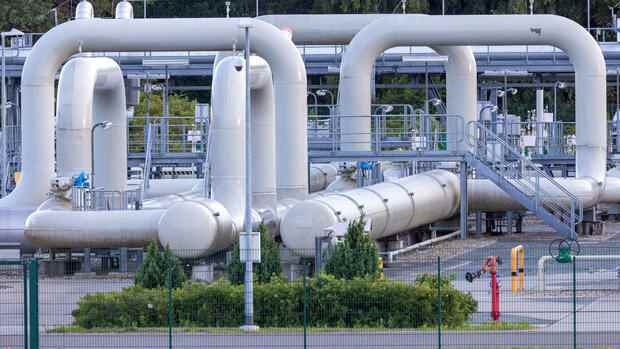According to Krebs, without the 2022 energy crisis, there would have been a strong economic recovery.
(Photo: dpa)
The latest forecasts by the economic institutes have confirmed what many had already suspected: the energy crisis is pushing the German economy into recession.
The Institute for Economic Research in Halle (IWH) estimates that the German gross domestic product (GDP) in the year after the start of the Ukraine war – i.e. from April 2022 to March 2023 – will be more than two percent lower than in the same period of the previous year. The Kiel Institute for the World Economy (IfW) is somewhat more optimistic and forecasts a GDP loss of one percent.
Now, some economists say a 1% or 2% drop in GDP would not be so dramatic – the recession is “manageable,” so to speak. In addition, a group of economics professors, including Rüdiger Bachmann, Andreas Peichl and Moritz Schularick, propagated the position that the economic consequences of high energy prices due to the loss of Russian gas imports could not go beyond a GDP loss of three percent. There are at least four reasons why such theses are misleading.
1. Recovery without an energy crisis
First, it must be considered that without the 2022 energy crisis, a strong economic recovery would have taken place. For example, in April, the five leading economic institutes forecast economic growth of four percent for the year after the start of the Ukraine war in their joint forecast.
Top jobs of the day
Find the best jobs now and
be notified by email.
In comparison, according to current estimates, the energy crisis has led to a GDP loss of five to six percent. The new forecasts clearly contradict the assessment of those who have propagated a three percent GDP loss as the upper limit for the effects of a complete gas import ban from Russia.
2. Inflation effects must be taken into account
Second, rising energy prices are a major driver of inflation, and it is the high cost of living that people are most concerned about right now. A comprehensive economic policy analysis of the energy crisis must therefore always take the effects of inflation into account. Therefore, simple GDP comparisons with the corona crisis or financial crisis fall short. Because in these two crises, the inflation rates were low and at times even negative.
3. Underestimating the energy crisis
Thirdly, the model-based forecasts of the economic institutes underestimate the economic consequences of the energy crisis. Because the current energy price increases are unique in the history of the Federal Republic of Germany. Even the turbulence during the oil crisis in 1973 and 1974 is surpassed.
Tom Krebs is Professor of Macroeconomics at the University of Mannheim.
(Photo: Alex Kraus/Kapix)
This means, among other things, that the usual model simulations cannot fully capture the effects of sharply rising energy prices on aggregate demand.
In addition, the forecast values mentioned above do not take into account production losses that can arise if energy-intensive industry shuts down production and production chains are interrupted as a result.
4. Permanent damage from new economic crisis
Fourth, a new economic crisis will cause lasting damage beyond the losses of past recessions. The energy crisis hits a German industry to the core, which is already weakened after two years of the corona crisis, global supply chain problems and climate policy pressure to transform.
>> Read here: Recession yes or no, inflation up or down? Forecasts by economists differ drastically
An energy policy shock therapy like the one we are currently experiencing will therefore result in companies with a viable business model stopping production or leaving Europe.
These considerations show that Germany is facing the greatest economic and social challenge since reunification. The most likely scenario is an economic crisis that will outweigh the impact of the corona crisis and the financial crisis.
It remains to be hoped that politicians have recognized the danger and will respond with an appropriate rescue package. The current relief programs are a first step that must be followed by further steps.
More: Impending liquidity crunch is becoming a risk for many German companies
